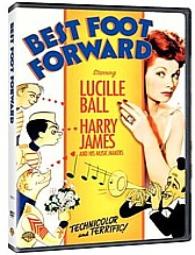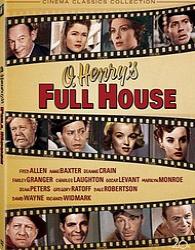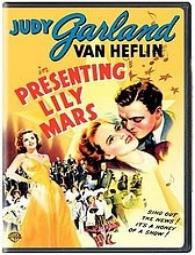
Knight at HOME at the Movies
Unsung Classics
It's been awhile since I've recommended some classic DVD releases and here are three terrifically entertaining, often overlooked
films, that easily fit that category. All three are making their DVD debut. But don't get all sticky moon candy over these three --
they're slick, expert entertainments straight out of Hollywood the Dream Factory -- and pleasurable in a way that's satisfying rather
than electrifying. You'll enjoy these if you're a classics fan -- and if you're not -- well, head straight for the ARCHIVES!
It's been awhile since I've recommended some classic DVD releases and here are three terrifically entertaining, often overlooked
films, that easily fit that category. All three are making their DVD debut. But don't get all sticky moon candy over these three --
they're slick, expert entertainments straight out of Hollywood the Dream Factory -- and pleasurable in a way that's satisfying rather
than electrifying. You'll enjoy these if you're a classics fan -- and if you're not -- well, head straight for the ARCHIVES!
MGM’s Arthur Freed, producer of the studio’s lavish musicals was noted for signing talent
and then leaving it alone. And Freed was quick to recognize that bringing in talent from
the world of the Broadway stage was a smart move. Both in front and behind the camera,
Freed was responsible for hiring everyone from Gene Kelly to Vincente Minnelli and then
giving them their head while they found their footing.
Freed was immediately taken with the score for Best Foot Forward by Hugh Martin and
Ralph Blaine when he saw the peppy little college musical on Broadway in 1941 and a
good example of these "let 'em alone to create" Freed trait. He quickly bought the
property and in addition to the songwriters (who went on to write the score for Meet Me in
St. Louis) signed up the show’s fresh new talent – June Allyson, Nancy Walker, and Gloria
DeHaven were among the cast. The story revolves around young cadets at the Winsocki
Military Academy and their annual big dance. One of the cadets is star struck and has
written the object of his affection, Lucille Ball, and invited her to be his date to the prom.
All without telling his girlfriend, Virginia Wiedler (memorable as the child of Norma Shearer
and the unseen “Steven” in The Women). On the advice of her press agent (the scheming
William Gaxton), Ball accepts the invitation. Mayhem naturally ensues when she shows up
on campus.
Most of the action is set at the big dance with some fresh, energetic numbers performed
by the brash young cast. Nancy Walker, my favorite, stands out as the supposedly
“homely” man crazy girl who detonates every punch line like the pro fans would
immediately love for years to come. In typical MGM fashion, the settings are lush (what
school could actually get the Harry James orchestra to play at a school dance?) and typical
of the studio artificiality of the period. The whole thing is in gorgeous Technicolor and
Ball, in her pre-I Love Lucy days, looks ravishing as the brittle starlet. The film, a 1943
release, is a nice little waste of time. The disc, out on Warner Home Video, includes
several vintage extras.
Next up is 1952’s O. Henry’s Full House from 20th Century Fox. The famed short
story writer had five of his best adapted, directed and acted by some of Fox’s top talent of
the time. Henry specialized in the twist ending that added meaning or whimsy to the
previous tale. His expert writing translates beautifully in these screen adaptations. Gay
actors Charles Laughton and Farley Granger appear in two of the tales and are joined by a
stellar cast that includes Jeanne Crain, Anne Baxter, Richard Widmark, David Wayne, Jean
Peters, and more. On the brink of stardom, Marilyn Monroe has a memorable moment in
the first of the stories, “The Cop and the Anthem,” in which Laughton co-stars with
Wayne. The final story is O. Henry’s best known, “The Gift of the Magi,” in which Granger
and Crain play a desperately in love but desperately poor couple trying to come up with
the money for Christmas presents for each other. In between are the humorous “The
Ransom of Red Chief,” the dramatic “The Clarion Call,” and the moving “The Last Leaf.”
Each of the stories is introduced – in a very rare screen appearance – by writer John
Steinbeck. This is a very entertaining, heartwarming film that has been meticulously
restored by Fox (a comparison is included). Other extras include informative featurettes
on the life of O. Henry, a visit to the O. Henry museum, and two early silent shorts also
adapted from his stories. I'm also happy to report that Fox has included a nice two-fold
booklet with a lot of information on the film. Bring back those inserts!
Finally, Judy Garland fans will be thrilled that one of her most enjoyable starring vehicles,
Presenting Lily Mars, is here at last on DVD. This little gem from 1943, also from
Warner Home Video, was a product of MGM’s other musical producer – Joe Pasternak –
and bears the stamp of his unit – not quite as lavish, even more frenetic, and decidedly
more whimsical. All this serves Garland well who betrays none of the edginess that crept
into her films as the 1940s progressed. Judy plays the title character, a 19 year-old (like
herself) who desperately wants to get into show business. Stuck in small town Indiana,
she attempts to audition for a successful Broadway producer (Van Heflin) who is in town
for a visit. When he puts her off – after several hilarious attempts by Lily to get taken
seriously – the ever cheerful Lily follows him to New York determined to catch his ear.
Naturally, she eventually will and ends up singing a rousing “Broadway Rhythm.”
Filmed in black and white, Garland’s comic timing is greatly on display though,
surprisingly, she’s not given nearly enough songs to perform. Oddly, her “rival,” the
opera singing Marta Eggerth, seems to get more song time. Expert support is offering by
Spring Byington, Fay Bainter, and Richard Carlson, and future jazz singer Annie Ross plays
one of Garland’s little sisters. The disc includes several vintage extras, the radio version
with June Allyson standing in for Judy, and some rare audio only outtakes and alternate
versions.
and then leaving it alone. And Freed was quick to recognize that bringing in talent from
the world of the Broadway stage was a smart move. Both in front and behind the camera,
Freed was responsible for hiring everyone from Gene Kelly to Vincente Minnelli and then
giving them their head while they found their footing.
Freed was immediately taken with the score for Best Foot Forward by Hugh Martin and
Ralph Blaine when he saw the peppy little college musical on Broadway in 1941 and a
good example of these "let 'em alone to create" Freed trait. He quickly bought the
property and in addition to the songwriters (who went on to write the score for Meet Me in
St. Louis) signed up the show’s fresh new talent – June Allyson, Nancy Walker, and Gloria
DeHaven were among the cast. The story revolves around young cadets at the Winsocki
Military Academy and their annual big dance. One of the cadets is star struck and has
written the object of his affection, Lucille Ball, and invited her to be his date to the prom.
All without telling his girlfriend, Virginia Wiedler (memorable as the child of Norma Shearer
and the unseen “Steven” in The Women). On the advice of her press agent (the scheming
William Gaxton), Ball accepts the invitation. Mayhem naturally ensues when she shows up
on campus.
Most of the action is set at the big dance with some fresh, energetic numbers performed
by the brash young cast. Nancy Walker, my favorite, stands out as the supposedly
“homely” man crazy girl who detonates every punch line like the pro fans would
immediately love for years to come. In typical MGM fashion, the settings are lush (what
school could actually get the Harry James orchestra to play at a school dance?) and typical
of the studio artificiality of the period. The whole thing is in gorgeous Technicolor and
Ball, in her pre-I Love Lucy days, looks ravishing as the brittle starlet. The film, a 1943
release, is a nice little waste of time. The disc, out on Warner Home Video, includes
several vintage extras.
Next up is 1952’s O. Henry’s Full House from 20th Century Fox. The famed short
story writer had five of his best adapted, directed and acted by some of Fox’s top talent of
the time. Henry specialized in the twist ending that added meaning or whimsy to the
previous tale. His expert writing translates beautifully in these screen adaptations. Gay
actors Charles Laughton and Farley Granger appear in two of the tales and are joined by a
stellar cast that includes Jeanne Crain, Anne Baxter, Richard Widmark, David Wayne, Jean
Peters, and more. On the brink of stardom, Marilyn Monroe has a memorable moment in
the first of the stories, “The Cop and the Anthem,” in which Laughton co-stars with
Wayne. The final story is O. Henry’s best known, “The Gift of the Magi,” in which Granger
and Crain play a desperately in love but desperately poor couple trying to come up with
the money for Christmas presents for each other. In between are the humorous “The
Ransom of Red Chief,” the dramatic “The Clarion Call,” and the moving “The Last Leaf.”
Each of the stories is introduced – in a very rare screen appearance – by writer John
Steinbeck. This is a very entertaining, heartwarming film that has been meticulously
restored by Fox (a comparison is included). Other extras include informative featurettes
on the life of O. Henry, a visit to the O. Henry museum, and two early silent shorts also
adapted from his stories. I'm also happy to report that Fox has included a nice two-fold
booklet with a lot of information on the film. Bring back those inserts!
Finally, Judy Garland fans will be thrilled that one of her most enjoyable starring vehicles,
Presenting Lily Mars, is here at last on DVD. This little gem from 1943, also from
Warner Home Video, was a product of MGM’s other musical producer – Joe Pasternak –
and bears the stamp of his unit – not quite as lavish, even more frenetic, and decidedly
more whimsical. All this serves Garland well who betrays none of the edginess that crept
into her films as the 1940s progressed. Judy plays the title character, a 19 year-old (like
herself) who desperately wants to get into show business. Stuck in small town Indiana,
she attempts to audition for a successful Broadway producer (Van Heflin) who is in town
for a visit. When he puts her off – after several hilarious attempts by Lily to get taken
seriously – the ever cheerful Lily follows him to New York determined to catch his ear.
Naturally, she eventually will and ends up singing a rousing “Broadway Rhythm.”
Filmed in black and white, Garland’s comic timing is greatly on display though,
surprisingly, she’s not given nearly enough songs to perform. Oddly, her “rival,” the
opera singing Marta Eggerth, seems to get more song time. Expert support is offering by
Spring Byington, Fay Bainter, and Richard Carlson, and future jazz singer Annie Ross plays
one of Garland’s little sisters. The disc includes several vintage extras, the radio version
with June Allyson standing in for Judy, and some rare audio only outtakes and alternate
versions.



